#in a good and humble way
Text
Hasn’t seen this interview before… interesting how he talks about the role not being comfortable for him. He always seems a little uncertain and unsure of himself - maybe that’s what makes him such a great actor, the continual need to grow and learn and create
#shaun evans#itv endeavour#interviews#he comes across as quite vulnerable here#in a good and humble way#thinking thoughts
16 notes
·
View notes
Text







I don't want to regret the way I lived
#my art#jujutsu kaisen#jjk#fanart#jjk fanart#jujutsu kaisen fanart#yuji itadori#gojo satoru#nobara kugisaki#nanami kento#choso kamo#junpei yoshino#jjk leaks#jjk spoilers#jjk manga spoilers#this idea started as a 2 part series . then my braincells decided to spark and supplied 7 PAGES#'did you sleep hina' no#ws looking up mentally stable things like 'who has died in jjk' smh i love my hyperfixation media im sooooo glad so many ppl r DEAD#i *could* have included more ppl but i think this is a good crew. this is a yuuji emotional support crew#also Was gna include his grandpa final panel but i Did Not Want To#he is implied through th dialogue#side note i donot like how i cn see this scenario playing out . ..yuuji this isnt ur stop u r monopoly voice Just Visiting ok >:(#anyway I broke my own heart with this and ik i hyped it up a lot but i hope that its not just me...#hope i did not hype it up fr nothing and no one else finds it devastating :((((( that would b humbling in the worst way#pls ...join the happy party train.......i hate it here i suffered pls :<<<<#also !!!! colours in this !! i cooked i fear . adding th first bit of warm hitting yuuji's face after th first 2 panels....#ive never had that kind of experience while drawing before it was wild . painful ! but wild.#the whole transition from p 2->3 might b the most emotionally moving piece ive ever made to me#not 2 sing my own praises tho i will shut up ! i wil. nap
7K notes
·
View notes
Text
I've said this before but valjean's view of the bishop throughout the book gets me so bad because like. he knew him for what, a day maybe? and it absolutely had a vast & profound & positive impact on him. but then he goes on to spend the whole book comparing himself to his idealized vision of the bishop & finding himself wanting & feeling guilty and miserable about every petty or selfish thought that crosses his mind. but it's so fucked up because like we as the readers know the bishop better! we've read the whole first book and we know he came from a privileged & wealthy background, that he was a rake when he was young, it wasn't til he was in his 40s or 50s to have some sort of change of heart & become a priest (a similar age to valjean when he met him!), that he has moments that seriously shake him, that he has some dubious politics left over, that he still has moments of pettiness he has to work through on the page (his initial approach to the member of the convention, e.g.). and also he's just kind of a weird old guy (affectionate). and like this is not to criticize the bishop, I think he's a genuinely really good guy, just that while the bishop has a realistic view of himself & his past ("he described himself with a smile, an ex-sinner,"), valjean is not getting any of this except maybe like. what would be mentioned in the newspaper when the bishop died. so his whole view of him is of this one shining moment where he changed his life and he feels he doesn't live up to that. which is sad! because the bishop understood him more than he realized & wouldn't have wanted him to feel that way
#haven't edited this post so hopefully it makes sense#there is also something to be said for the other way that i think valjean comparing himself to the bishop unfavorably is unfair because#like the bishop is very much coming from a place of privilege & respect & authority not just in his background but in his current position#which is not to devalue any of his truly good work ofc!! but just that in many ways it's Easier to be good & charitable & humble & kind etc#if you're coming from a place of security y'know? <- and this is something the narrative of the book gets even if jvj doesn't#thoughts#les mis#anyways this is one of the reasons why the bishop sections are important & any abridgement would make the text poorer
507 notes
·
View notes
Text
Yk I think a lotta the bill cipher designs out there are definitely underestimating how WEIRD this guy is like. No bro he would not be a suave, put together, sane looking handsome man/thing. Ohhh no bro he gonna look fucking WEIRD and he definitely acts the part in the show. Like the way he talks, the way he carries himself, as much as he’s good in the art of manipulation, he is incredibly off putting about it.
Tbh? This is probably what drew ford in more then anything else. Bill manipulated him yeah- but he was also just so confident in his weirdness- he was ODD and not shy about that idea. He enjoys being odd to humans, he enjoys their discomfort. And ford never had a place to be as odd as he is, as much as he thought gravity falls would provide this refuge- it was ultimately bill. Bill was this big weird off putting refuge from the normal world that ford always craved so dearly.
#terminal old man yaoi#I’m so tired GET THEM OIT OF MY HEADDDD#they won’t LEAVE#tbh??? my ostracized ass?????? falling for all bills stupid tricks immediately#as unfortunate as this is. I understand ford. its so bad bc he’s literally such as asshole but GOD THATS HOW IT IS#like when you can’t connect with ANYONE in ANY significant Fucking Way. the only way to cope without spiraling completely is getting like a#crazy superiority complex. it’s so bad but it’s so real.#like ohhh no one likes me??? what if I act like an egomaniac??#no bro that does NOT make it better😭🙏#luckily I got hella humbled but uh. now it’s the other way. there’s not a good answer for this#gravity falls#standord pines#billford#bill cipher#bill ci the triangle guy
114 notes
·
View notes
Text
"Oh so when James Kirk refuses to believe in no-win scenarios it's 'changing the conditions of the test' and 'commendable original thinking,' but when I, Bradward Boimler, can't accept the possibility of failure and retake the Kobiyashi Maru sixteen times–"
#lower decks#star trek lower decks#brad boimler#in my headcanon his first performance wasn't *great* but he did technically pass#but by refusing to accept that he hadn't beat the test and insisting on retaking it he turned his pass into a fail#and he *kept* retaking it until the instructor point-blank told him that there was no way to beat the program#And that the whole point was to experience personal failure#And *even then* Boims was like “so you mean by failing I actually HAVEN'T failed at all!”#“No that's not– ugh you know what sure. Gold star kid. Just get out of my office." ”Did I get an A+?“ ”OUT!“#Completely missed the point of the exam and they basically pity-passed him after the seventeenth try#Mariner on the other hand already knew what the point of the test was ahead of time#(She didn't cheat she was still a goody-two-shoes at this point) (An older classmate or friend happened to mention it around her)#But she *did* think it was a bullshit test and just pretended to be humbled and accept defeat in order to get a good grade#She doesn't believe in no-win scenarios either#It's part of what makes them a good team
417 notes
·
View notes
Text
griffith - nails, hair, hips, heels
#i could have gone to sleep but like. what would be the point. ive ruined my sleep schedule for way less deserving things so might as well#anyway hiiiiiii this is nowhere near as good as my good old-fashioned lover boy edit but please accept this humble gift#personally im very fond of the ending <3#berserk#griffith#griffith berserk#taps the mic hi id like to specifically thank the op of the fanart where griffith drinks c u m out of a teacup i wouldnt b here without u o7
183 notes
·
View notes
Text
i finally got around to watching archie madekwe's interview with in creative company and it was astounding, for one. i geeked the fuck out. there's so much to talk about.
his and emerald's understanding of farleigh's character on such a deep level, not just what was on screen, but in his past and in his thoughts... gagged! i was very interested in his interpretation of farleigh's family; archie considers farleigh's mother as a kind of enigmatic fallen star who behaved more as a friend than a parent. archie describes farleigh's childhood as overly mature and neglectful, with the character having to experience more mature and adult situations than he might've in a different family.
another important thing archie touched on was the power dynamics between oliver and farleigh, and how threatening they appeared to each other. archie believes that farleigh didn't truly understand the genius of oliver and how intricate a game he was playing; that never stopped farleigh from observing oliver at any opportune moment. eventually, farleigh had a deeper understanding of oliver's sinister obsession with felix, as well as the way he manipulated the family. this is why, in the karaoke scene, farleigh doesn't bite the bait that oliver offers him. he's not grateful for oliver's sympathy or companionship; he's appalled that oliver would even have a personal conversation with him in the first place.
the dynamic archie describes between felix and farleigh is also really interesting to me. he discusses the transactional nature of their relationship, but also how deeply farleigh loved felix. there was also the need to learn exactly how to behave amongst the cattons; when to pull away, when to fade into the background, where to assert or insert yourself in a situation. farleigh is, above most other things, an observer. the nature in which oliver behaves in the early summer, how clumsily he navigates conversation, incited a lot of judgement from farleigh. part of it was the knowledge that oliver didn't quite fit, didn't make sense among the cattons.
archie talks about how self-serving the majority of farleigh's socialization is, at oxbridge. his opening line is entirely intended to cater towards the people he is walking with. there has always been a need for farleigh to adapt, observe, overthink. in this environment, love is neither unconditional nor reliable.
the biggest difference i've clocked between farleigh and oliver is the way they play the game. farleigh plays his own cards, he analyzes what he's seen, and acts accordingly. whereas oliver integrates, injects, and manipulates. farleigh is playing poker while oliver is playing chess.
i'm an actual blabbermouth.
#farleigh start#oliver quick#archie madekwe#i could actually listen to archie talk about anything for however long and it would be the most engaging thing of my life#hyperfixation rizz#saltburn#saltburn 2023#farleigh is my favorite last girl#he's got a damn good poker face#you have to admit#the way he played oliver in that karaoke scene?#diabolical#someone needed to humble that white boy#only farleigh could do it!
271 notes
·
View notes
Text
Y’all, entire tmnt fandom, what did 12 Splinter do!?!???? I feel like everywhere everyone hates him but Why??
I am genuinely so curious because, especially compared to Rottmnt, Tottmnt, and what I’ve seen of 2003, he (12!splinter) is objectively the best parent?? What am I missing?
Oh and attaching a poll to this as well,
#honestly Tottmnt splinter isn’t… that bad of a parent I guess?#but he’s definitely not great#tmnt#tmnt 2k12#tmnt 2012#tmnt fandom#tmnt 2k18#Rottmnt#rise of the tmnt#Tottmnt#tales of the tmnt#tmnt 2003#tmnt 2k3#tmnt splinter#tmnt 2012 splinter#In no way am I trying to be confrontational#I seriously want to know#bc 12splinter in my humble opinion id fantastic#is*#tmnt poll#maybe I’m just wrong and people don’t hate him#but I feel like I’ve seen a good bit of it
55 notes
·
View notes
Text




Go to bed. I’m right here. You can see me anytime.
JING BORAN as Fei Ke
Regeneration (2024)
#regeneration#regeneration 2024#新生#cdramaedit#userdramas#cdrama#asiandramanet#cdramasource#dailyasiandramas#tvedit#新生2024#tuserjade#samblr#useryd#mymymy#ep 1#LOOK YOU ALL NEED TO WATCH THISSSSSSSSSSSSSS#sRSLYYYYYYYYY#while i cant say i enjoyed the ending that much..... just nawww...... the JOURNEY TO GET THERE WAS BANGINGGGGG#JING BORANNNNNNN#he neeeeedsss to do more roles like this cause brooooooooo#ALL MEN DO IS LIEEEEEEEEEEE... or do they? LOL#fei ke... FEIII..... KEEEEEEE.... shoookethhh#this whole things a tragedy in so many ways and I don thave the time or dedication to give the goods it needs to be seeen by more people#this is my humble addition like others to tempt youuuuu
90 notes
·
View notes
Text


[11]
Yuuko debrief time!
I love how we have in-text examples of exactly what Yuuko is talking about over in Tsubasa. As she says, if someone actually has a void then it won’t actually elicit any emotional response, because they feel nothing about it - just like when Syaoran’s soul went missing and he really was just emotionless all the way down. He couldn’t feel anything because there was nothing to feel with. And Yuuko uses that concept as a way to show Watanuki that even though it seemed to end badly he was actually completely correct and did actually offer her something valuable, but it was her choice not to take it.

OH OH OH I LOVE THIS SENTIMENT EVEN MORE.
Watanuki, the sunshine child, worries that she didn’t want to hear what he had to say. But Yuuko puts aside whatever the customer might or might not want and puts Watanuki’s own feelings on the same level of importance.
If Watanuki WANTED to express that sentiment then his feelings are valid and he has every right to have said it. His feelings and opinions are every much as important as anyone else's and deserve to be expressed. He is allowed to take up space in the world and be a full person, not only when it is conveniently what the other person wants to hear.
Which is a sentiment Watanuki might not fully grasp just yet BUT ONE DAY.
#It took me a very long time to learn this also#I think it is especially hard to learn when you are the ‘nice’ one#And Watanuki tries so hard to be nice!#Which! Is another reason why Doumeki’s friendship is so good for him#It gives him space to HAVE opinions and express them#Completely in the face of anything Doumeki might want to hear#Perhaps even deliberately to spite what Doumeki wants to hear#And it’s a good way to balance out his more humble instincts#He deserves to be heard!#Not liveblogging the reservoir chronicle#xxxholic 89#xxxholic#Watanuki#Yuuko Ichihara#I guess I’m saying Watanuki is naturally very... demure very... mindful#But the growth is in being not JUST that
61 notes
·
View notes
Text
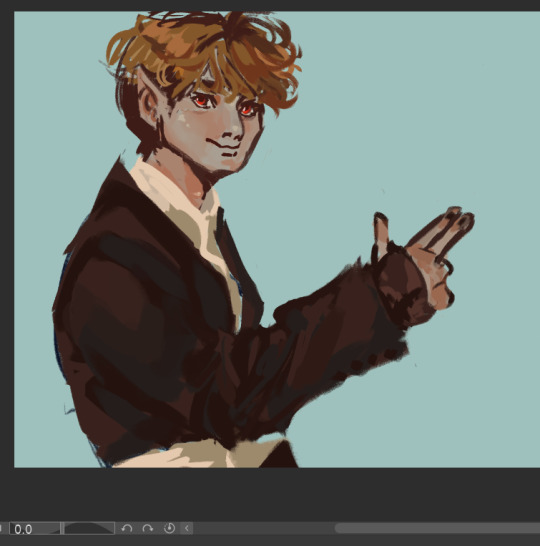
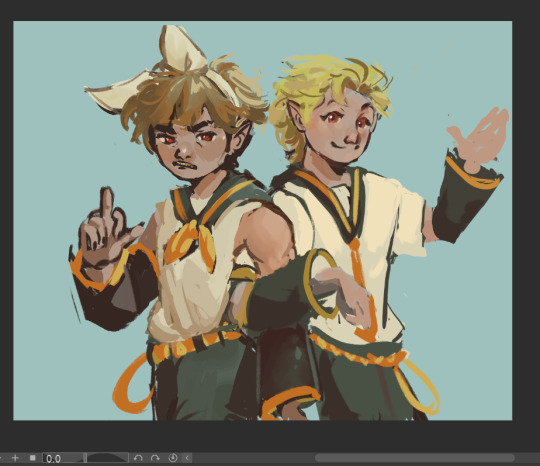
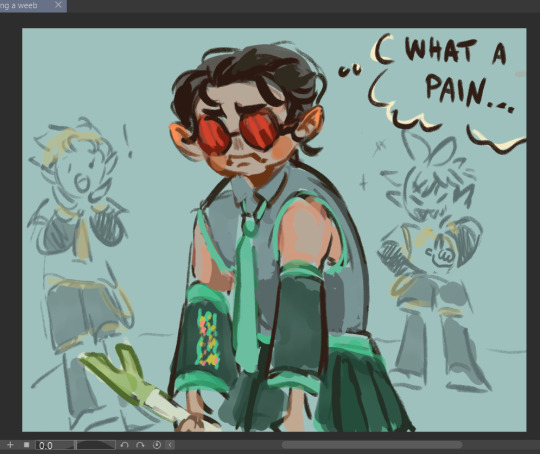
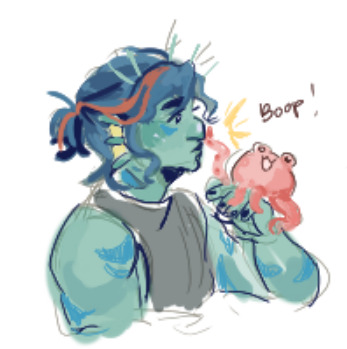
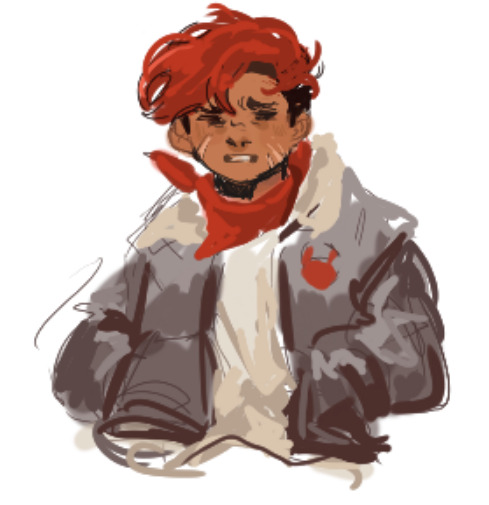
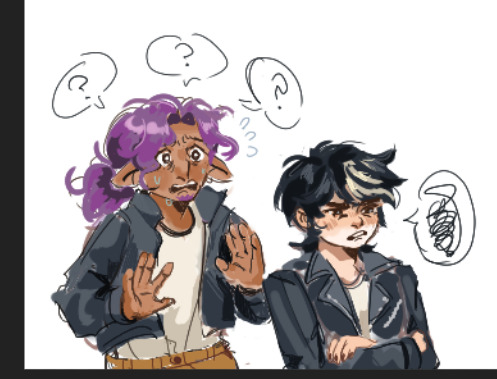
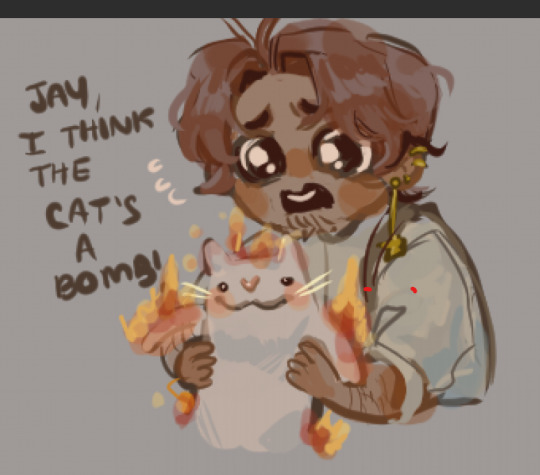
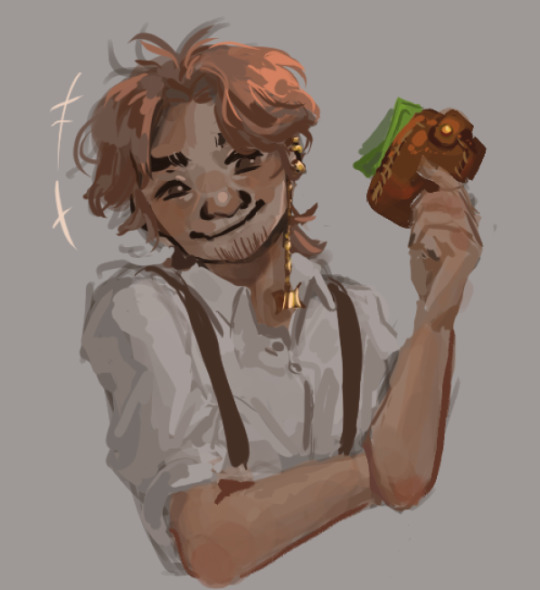
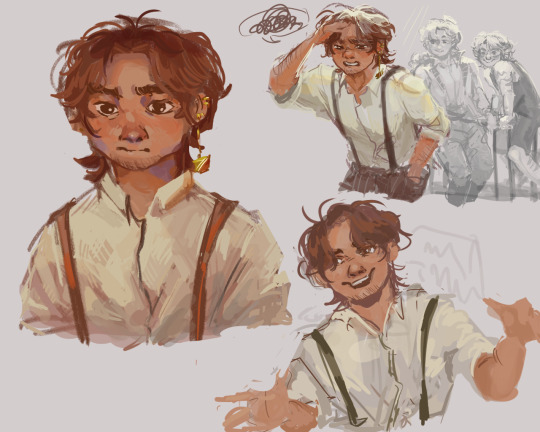
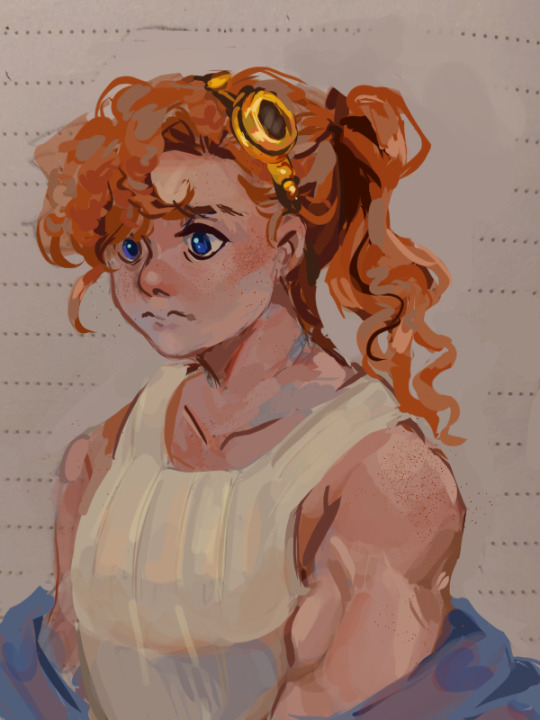
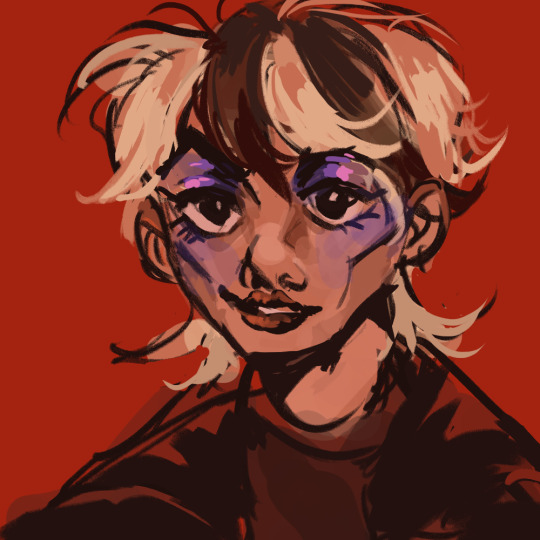
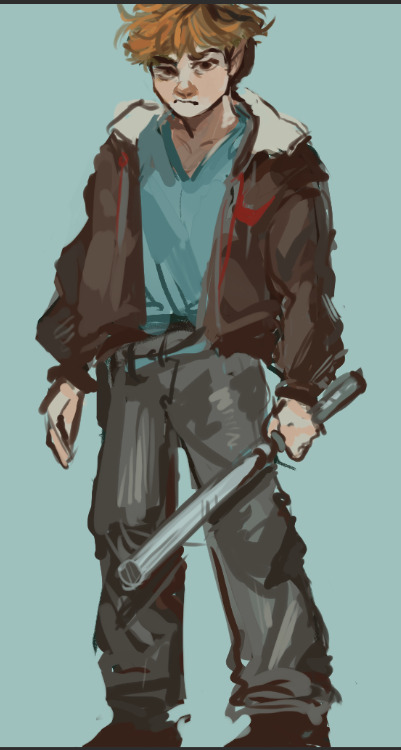
lil drawings from the past month from twitter (and also stuff i never posted from a magma askljdlas)
Spoilers for the Suckening finale under the cut!
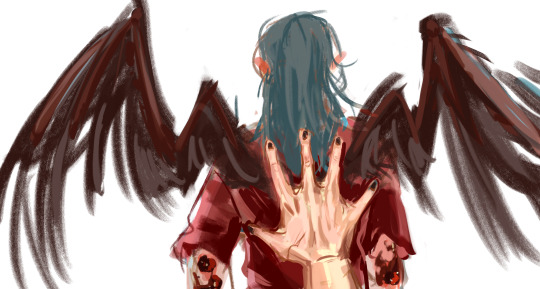
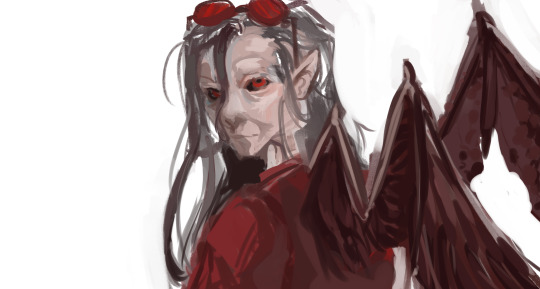
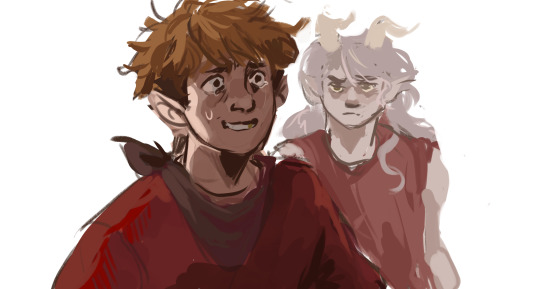
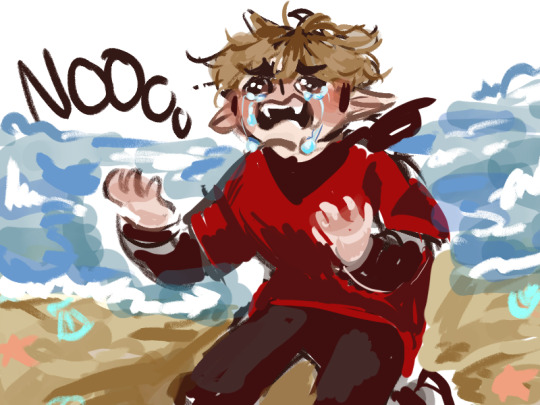
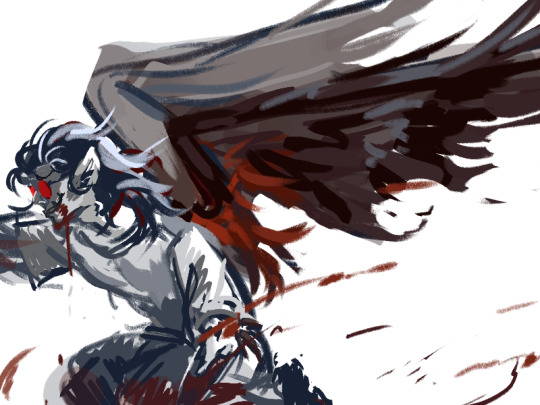
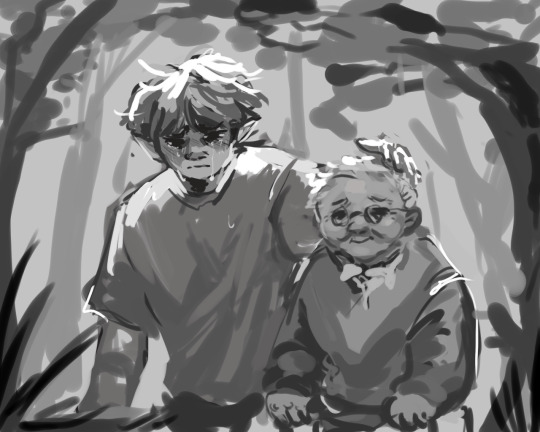
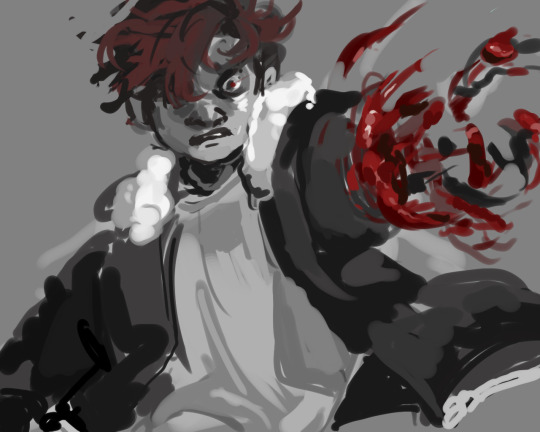

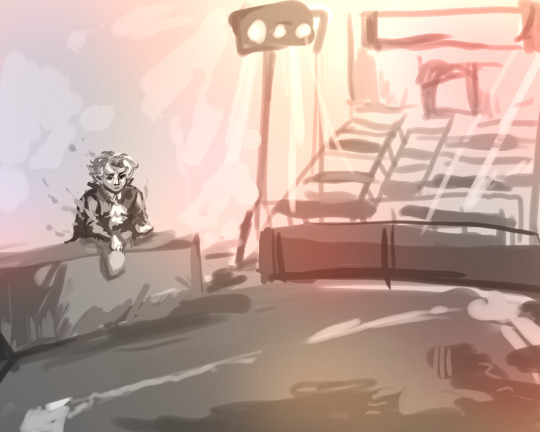
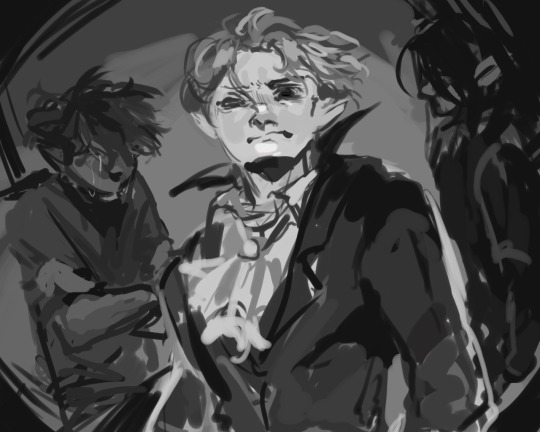
#jrwi#orangetriestoart#rahHHHH ngl ive been struggling w/ gettin my art to look the way i want it to so ive been trying to study a lot more ;A;#ive been practicing drawing backgrounds and such from reference and its so humbling but!!! im learning!!! fuck it we ball#but the suckening has been so good for art motivation i swear to god im so sad its over <-- has already started a rewatch jdaslkdjaslk#hdasjkhadsjk n e ways if ur somehow reading this have a good day!!! or night if its night-
113 notes
·
View notes
Text
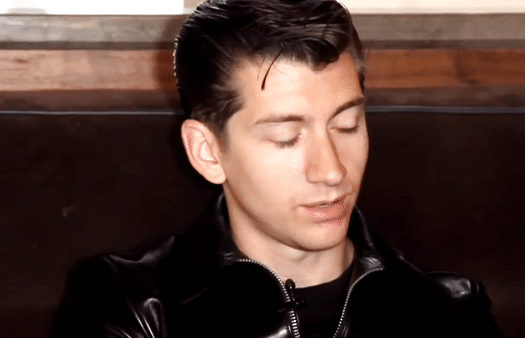
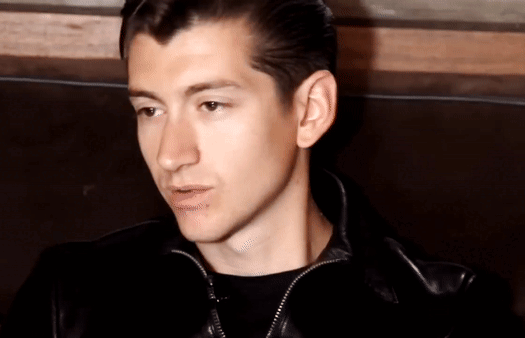
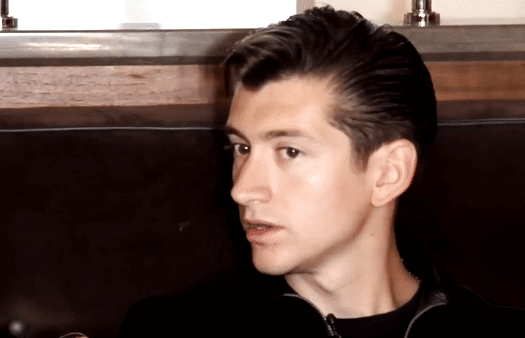

"It's quite hard to blow that trumpet... but I'll give it a go." [x]
#this is such a cute little snippet#he's too humble for his own good#also hilarious#the way matt snorts when he says that#<333#and he is so beautiful??? 😭#that perfect face#the little diamond 💎#his skin is flawless#how did that happen#he's literally glowing this mf#such a stunner#alex turner#arctic monkeys#my gifs
147 notes
·
View notes
Text
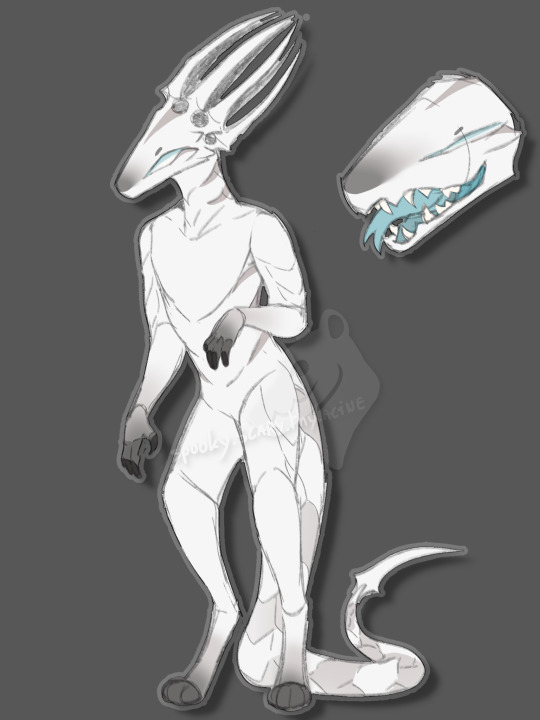
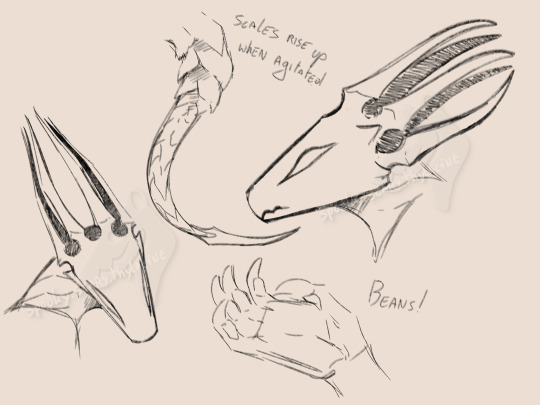
This design came to me right after I woke up and I think I'm gonna use it for one of my AUs
#hollow knight#the pale king#hk pale king#my art#spooky arts#humble pie au#My singular GREAT dad PK. The others suck in some way he's the only good one#When he was a king his markings were obscured because of his glow but life and void poisoning took a toll on him so he's no longer as#bright and you can actually see his stripes and point markings :] his claws are a little darker coz. Void#Realistically he probably would have his stomach crotch and legs stained with void to but I am. Not drawing that#Like yeah injecting himself with void and laying void stained eggs would probably leave a mark. Still not drawing that
182 notes
·
View notes
Text
the Pathologic essay I wrote last year about why I think the Haruspex route Utopian ending is the overall best ending, I still stand by what I said however this somewhat structured essay holds less than half about how much I care about this ending.
also it is just canon LOL

In the game Pathologic there are three different routes, each corresponding to each healer. The story also has several endings, one for each of the bound (characters which as the name implies, are bound to their individual healer) as well as a bad ending if the player fails to find any sort of viable solution for the plague. This ability to choose the ending belonging to another healer is an incredibly telling one on the part of the characters, especially when it comes to the Haruspex, and his ability to choose the Utopian, and the Bachelor’s ending. This ending also works quite well when considering the wider narratives of the Haruspex’s route, including the future of the town, his role and sacrifice, and the metanarrative of the story.
In all three routes there lays quite a large weight on the future of the town, as of course it is the battle of the ending, of which vision of the town would become reality. The Haruspex’s bound is known as the Termites, a collection of children who learned from Isidor Burakh, Artemy Burakh’s father. Their ending is the one in which the Polyhedron is destroyed and the town stands, ready to be developed by a future generation. However, it is discovered in one of the other routes of the story, the Bachelor’s route (we will get to him later) that the source of the infection lies underneath the town, in the pockets of blood which have collected beneath. This means that the plague can never be fully defeated unless the town itself is destroyed, as the Polyhedron has already pierced the ground, meaning that there is no returning the plague to its dormant state, trapped underneath the earth. On the other hand, the other side of the river is entirely uninhibited, clean of the plague. This complete lack of prior development also means an ability to create a new town.
The new town built after the Utopian ending is one made, as the name implies, by the Utopians, however, the asymmetrical narrative changes depending on which healer is the one being currently played by the player, so following that logic, the endings would be influenced as well. This would hypothetically mean that the vision Capella has for the future of the town, one in which the Haruspex is a leader of the kin, and the town would be led by the children, could still find its place within the new town. There are also direct connections between the Utopians and Termites as well, such as Casper Kain, also known as Khan, of the termites, being a termite while also being part of the Kain family, which means that despite the rocky relationship amongst the family, he is still a heir to that power. Capella as well, is the sister of Vlad the younger, who at that point is the eldest Olgymsky remaining, and the projected leader of the town’s industry in the new town, she has also planned her engagement to Khan, meaning that she would then have a connection to Kain family as well. Apart from these direct connections, the entirety of the bound is important, each member, independent of faction, still able to impact the future of the town, and in order to achieve the Utopian ending in the Haruspex route both the Termites and Utopians must be fully healed. However these are the more hypothetical results of the ending, in the game itself the cutscene remains the same for whichever healer chooses the ending, which can imply the uniformness of the ending. However even though the Utopian ending described in differing routes can still serve the Haruspex well, the utopia described in the Bachelor route is explicitly stated to need the Earth, “…it's all about what's down below. It requires dirt. A ruby firmament needs something to sit atop-otherwise it'd topple.” This coincides well with the future Capella predicts, with the Haruspex taking his place as the foreman of the Abattoir, showing that there is, in fact, a place for the “earthly and the humane” in the new town. The connections described within the route, the needs of the utopia, and especially the influence of the Haruspex himself, would allow the Utopian ending to be a fitting future in the Haruspex route.
Another very present aspect of the Haurpsex’s route is that of his sacrifice, the idea that he must destroy, kill, something or someone in order for his ending to occur. This concept is mentioned a few times, however it is only fully explained by Katerina Saburova, “You will make a sacrifice. There will be rivers of blood, and that will be your doing.” While I can go into a whole other essay about the ideas of the sacrifice (and I do), we will for this essay’s sake, take the sacrifice as it’s surface level in pathologic classic, and how it’s implications mean that choosing the Utopian ending would have better long-term effects and also complete the Haruspex’s journey.
The Haruspex’s story follows a more classical hero’s journey rather than the Bachelor’s tragedy, with the abattoir symbolising the other world, and Oyun assigning the quite literal trials the Haruspex must go through. Once the Haruspex defeats the Foreman and becomes the new Foreman of the abattoir, however, he is still not respected by the butchers, who require a sacrifice from him. This duality of both the mistress’ prophecy and the requirement of the butchers also shines a light on the Haruspex in Pathologic Classic, someone who knows that he is of two worlds, however also a person who takes pride in both of them, and brings them together.
In the Termite ending the sacrifice is not fulfilled, the Haruspex is not allowed access to the blood, the plague looms as a remaining threat, and the Polyhedron still falls, for nothing.
Unlike in Pathologic 2, where the Polyhedron is quite literally piercing through the heart of the Earth, slowly killing her, in classic it is nowhere near that fatal, still harmful, but not fatal.. This important distinction is also important to make with the fact that while the blood would still seep out from the open wound if the tower were to fall, it would be limited, and would dry out at some point, while on the other hand, completing the sacrifice would allow the Haruspex access to the blood in the Earth, as the butchers would allow him to find the hidden reserves.
The sacrifice herself, Aglaya Lilich is someone already doomed by the powers that be, a doll loved by their mother and so hated by them, she dies in every ending but the Termites’. There is, of course, a point to be made about the theme of a woman having to die for a man’s journey is not a good one, and choosing this ending would feed into a harmful cliche, however, her death is something she herself understands, and although she urges the Haruspex not to make it, she acknowledges that she is meant to be the sacrifice, that choosing this choice will be enough, “If you lead him to victory, you may consider your sacrifice made. You return to the exultant butchers, triumphant.” Her death is not regarded as a simple shock factor to the end of the story, it is the pivotal choice the Haruspex must make. This is also shown in the Changeling route, where saving Aglaya is seen as an act of deceit, as even Clara’s ending, which saves the town, requires Aglaya to die, as Aglaya is a ‘queen’ an important piece on the board at the end of the game, her life only allows for the Termite ending, only allows for the Haruspex to lose his standing within the kin, and only allows for the sacrifice of the Polyhedron.
The Polyhedron is viewed as the sacrifice in the case that the Haruspex seeks to save Aglaya, however would it even work as one? The sacrifice needed is one of equal value to the Udurgh, the body that contains the world, and if the Utopian route is the one followed, the Udurgh is Simon Kain, and so the sacrifice must be someone who is more than human, and yet human. The Polyhedron, on the other hand, contains no human element, yet, it is the container for a human soul, a chimaera of living and nonliving, however in the Termite ending it is empty, and therefore cannot serve as sacrifice. Both Katerina and Capella’s opinions support the Bachelor’s argument in favour of the Polyhedron standing as well, Katerina outright claiming that “ I know for sure that you are to destroy a woman…” However, seeing that Katerina’s prophecies are often wrong, this statement must be taken with a pinch of salt. On the other hand, Capella clarifies that while Simon is merely a man in the current time, however, “Had Simon been reborn though, had he transferred his spirit to a new vessel-a body huge, perfect, and able to let others in... then he could have been called that.” Well, that rebirth, that new vessel she describes just so happens to match up incredibly well to the Polyhedron, this means that for the Udurgh to exist, for the Haruspex to fulfil his purpose, he must let the Polyhedron stand, must let Simon become the Udurgh. These ideas of sacrifice, of fate, and most importantly, of duty and purpose, greatly define the Haruspex’s story, and the Utopian ending is the only ending which gives it the needed satisfaction by its end.
All of the prior points about the town and the sacrifice have been made with the greatest levels of constraint I was able to amount, this paragraph, admittedly, will be much more personal, as the reasoning it presents was the initial reason for my appreciation of this ending. Simply saying, this paragraph will discuss this ending and the Haruspex’s connections, specifically the connection to the Bachelor. This entire essay could have been written only about this, specific subject, however, there was much more to be said about this ending. This paragraph will discuss the relationship between the Bachelor and the Haruspex (of course) as well as the metanarrative of Pathologic classic, especially when it comes to the ends and in considering the Bachelor route in comparison to the Haruspex one.
During the Bachelor run, there is not a single chance to access the abandoned workshop the Haruspex works in, even trying to teleport into the workshop will fail, This comes with the precedent that as the Bachelor, you will not meet the Haruspex until the fifth day, from which point on he is only truly present for days 5,8,9, and of course, day 12. This is of course, a great disservice and the Pathologic 2 route should really have more Haruspex in it, however on a less tangential point, it a great difference from the haruspex route, in which the Bachelor appears for almost every single day of the playthrough, The Bachelor is likely to be the character the player interacts with the most, and over the game the connection between the two characters grows over time, with the Bachelor switching to use Artemy Burakh’s first name. However this closeness between the two is present throughout the entirety of the route, from the very first line the Bachelor speaks to the Haruspex (We will get to that later) to even the descriptions of quests and locations which the Haruspex takes note of, even I was surprised at just how much there was between these two in my first playthrough. All that builds to the point in which these two characters, at the very least, care for one another, deeply enough that the Haruspex has multiple dialogue options which are explicitly supportive of the Utopian ending within his Cathedral discussion with the Bachelor, with all but two of the dialogue branches allowing him to ask the Bachelor for his advice, and only one serving as a direct rejection. And that is what choosing the Termites ending in the Haruspex route is, a rejection, all throughout the route the Bachelor will attempt to convince the Haruspex of the validity of his ending, and in the Haruspex route, the Utopian ending is incredibly tied to the Bachelor, to Daniil Dankovsy, with the implication that if tower, if the last remainder of his research will not survive, that neither will he. Much like Aglaya, his fate is tied to the aspect of the town he is bound to protect. The Bachelor, who, while still placed as more antagonistic, still has his choice, his option for the ending still weighed as equally as the Inquisitor’s, the story places them as equals, “Two diverging pairs of decisions. Both pre-determined…” Which also clarifies that the Utopian ending was never less free than the Termite one, as they are both pre-written, scripted.
This leads into another extremely important aspect of Pathologic Classic HD, the meta, not only can you be reminded twice per round that the story is not real, but multiple characters and scenarios note that this is still a game, still a story the player is playing a part of. A big part of the meta story is the fact that the town is in fact, a sandbox, and the characters are merely dolls. The Polyhedron is a water container which was stuck into the sand, and the water within it had caused a mold, causing the sand pest within the reality of the characters. Removing the tower would help nothing; the mold has already spread, the only option forward is to remove the sand, or play somewhere else, which is what the destruction of the town means, the Utopian ending is the only one which actually, truly addresses this.
Another very meta aspect of the story is the relationship between the Haruspex and Bachelor, which is seen in the very first line spoken from the Bachelor to the Haruspex. The order the game suggests the routes is to begin with Bachelor, continue to Haruspex, and end with Changeling, and viewing the story as one continuous thing in that order adds a lot of depth to the story, with, “ Yes... Far be it from me to call myself a person of mystical inclinations. However, when I look at you, I get the feeling that nature is playing jokes on us. It's as if both the left and the right hand have clutched the head to realise for the first time that they are two parts of a single whole.” The Bachelor quickly disarms the player, not only is this statement a clear representation of the fact that they are two parts of a single whole, they are all healers, all part of the role the player plays, but this line is just plain out not something to say to someone you just met. Dankovsky continues his, less than normal interactions towards the Haruspex throughout the route, to the point that two of them have the closest connection here than almost any other two characters in any route, to the point even the developers themselves reflect upon it in that same dialogue I mentioned before, “Two diverging pairs of decisions… And then, you see, there were also feelings involved... Love.” While this can be applied to Aglaya instead, in the context of the conversation, which is Clara asking the developers about the two other healers specifically, that simply would not make sense. There is a lot more textual and meta evidence about these two, but I am straying off course too much already and this paragraph is already very very long, so we will just move swiftly back to the actual point of the essay :) (BUT YES I COULD WRITE A WHOLE ENTIRE THING ABOUT HOW DANIIL IS WRITTEN AS A LOVE INTEREST IN THIS ROUTE)
Let us not forget, however, a reason as to why the Bachelor wishes to destroy the town, and that is that Daniil is incredibly petty and jealous of Aglaya, from the initial curiosity at their initial meeting, “...She was so impressed by your dignified demeanour … What did you tell her that touched her so much?” To the outright spiteful, “My dear Burakh, she is your sacrifice! I don't think it is at all necessary to slit her throat with your own knife … if the town is destroyed, the head of Aglaya Lilich will be separated from her shoulders in less than a day.” He also partially agrees with Artemy that he seeks to keep the Polyhedron out of spite. However one must take into consideration the Bachelor’s route, in which he is consistently used and betrayed, the biggest offender being the Inquisitor herself. The only person who does not do so is the Haruspex, so it makes sense he would do quite literally anything to keep that being the case.
The fact is, Daniil Dankovsky suffers, in almost every single ending he is not at a good place, all of the endings from his own route for one, as that route is quite literally a tragedy, as well as the fact that Eva is dead in it, that also goes for Changeling route endings, as well as the fact that in that route he is in general incapable of a happy ending, which only leaves the Haruspex’s route for him to have any possibility of contentment (sorry g boy) Immediately we can also rule out the Termite ending in the Haruspex route, and in the Humbles ending he is the only one without a place, the Haruspex, as the Foreman, would still have a role to play, but Daniil would not, her victory is also the least rational one, and therefore, the hardest one for him to agree with. That leaves, of course, one ending, the Haruspex route Utopian ending, in which the Bachelor is not left in misery.
Other than that, this ending, just like all endings in which the player picks the ending of the bound other than their healers’ is a direct victory over fate, over the ‘set’ ending for the route. The executor, the stand-in for the developers in the ending of the game says as much, “The only enemy, the only evil in this story, you see, is called Inevitability…” This also lends itself to the idea that the belief that there is only one ‘right’ ending for each healer, that they should only be considered by their bound’s choice, is a wrong one. This refusal of fate, refusal of the ending implied to be the ‘correct’ choice of the Haruspex since the very beginning of the game, is the ultimate victory of the player, and of the characters with them.
In almost all discussion of the Pathologic endings, the only possibilities considered are the ones given, each healer choosing their own bound’s end, but Pathologic is far more dynamic than that. The story is asymmetrical, and so are its endings, which is why Bachelor’s route Utopian ending is quite possibly the most tragic, hopeless one, and the Haruspex route one is the complete opposite. There is no ‘good’ ending, of course, no, that would be too simple, however, there are some which are clearly better than others, and due to the future of the town, the impact this has on the Haruspex’s story, and arguably most importantly, the meta and interconnected aspects of this ending, it can be considered as a good ending. It is a belief that the Utopian ending in any context, is a bad one, however, in the words of the Haruspex himself, “Any choice is right as long as it’s willed.”
#pathologic#daniil dankovsky#artemy burakh#pathologic classic hd#burakhovsky#implied#a lot of the rest of my thoughts can be boiled down to “i kinned danko too hard oops”/hj#but there is so much to be said about this one particular ending and the way it does have the longest term good impact on the world#unlike most other patho endings which when considered outside of a vacuum would be really bad as things to happen to the real world#don't want to get into how the termite and humble endings are kinda conservative but utopian is the only one driving the world forwards#under artemy's influence it's even better
89 notes
·
View notes
Text
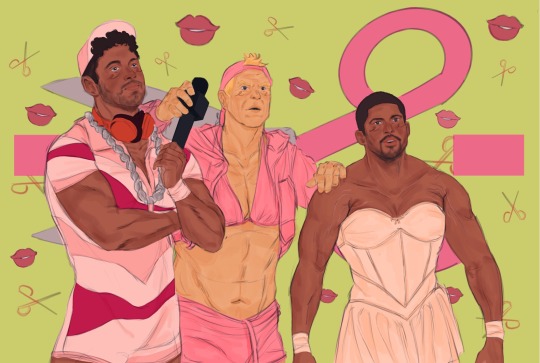
✂️saw these fits and it reminded me of a certain group✂️
#the acclaimed#aew#wrestling#max caster#anthony bowens#daddy ass#ive realised way to late how much effort i put into this why did i even color ittt#caster turned out really good in my humble opinion#also still dont know how to color my art sooo#billy gunn#i know Anthony and max arent middle-aged but the clothes fit them okay?!#max looks mentally checked out idk maybe hes thinking about mjf#i think most of the aew wrestlers could have cuter outfits so ill make it a reality!!#inviting everybody to zoom in on casters arm bc i think it looks hot#im sick of pink now the next thing ill draw will NOT be pink#eggon
97 notes
·
View notes
Text
i genuinely do believe that lian going down a more civilian, superhero-adjacent path rather than operating fully as a superhero would make for a compelling narrative.
already, lian has a very nuanced perspective on "the life" because of how intertwined it has been with her own life, more specifically, her childhood. she has been privy to the emotional and physical toll it takes on the people involved, and the things that are asked of them day in and day out. of course, she still admires her father and all her aunts and uncles, but she has seen enough to know that being a superhero is far more than having cool costumes and flashy powers (or unparalleled skills, like roy’s aim). she has also seen what it looks like on the other side, as in, she is aware that her mother's life as "cheshire" regularly conflicts with her life as "jade", ultimately making it more difficult to build a life as the latter rather than continuing with the former. her parents’ jobs (albeit different) have been points of contention in the past because there is no true balance between their personal and professional lives, their professional lives often trickling into their personal ones.
what would make the decision to not follow in roy's footsteps even more powerful, to me, is if she chose to experience it for herself and ultimately realized it wasn't for her. from there, she could get more involved with the community while also staying the hero-loop in some capacity. she could go the reporter route like lois and linda, be a public defender/engage in pro-bono work, help develop health clinics, improve conditions of shelters, etc.. there’s many different routes that she could take that would help support the work that is being done by her dad and family without necessarily being directly involved in that part of the fight.
#💭#lian harper#in my humble opinion it’s also a good way to marry the life her parents wanted for her with the one she had#as normal a life as she can get having a superhero for a dad a mom for an assassin#and a whole bunch of superheroes for aunts uncles and grandparents#this also is a good way to go into roy’s community work too#idk i just don’t think every superhero kid HAS to become a superhero#and i think the civilian route works best for lian#let her go to college and be semi-normal !
68 notes
·
View notes